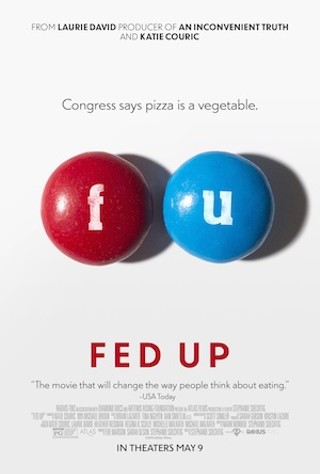A Food-Loving Mom’s Response to 'Fed Up'
Who is responsible for what we eat?
By Melanie Haupt, 11:30AM, Mon. May 19, 2014

I didn’t know much about Fed Up before going into it, just that it was another in a growing string of documentaries interrogating the food industry. I was suspicious when I saw the cliched montage of headless fatties, ready to dismiss the film out of hand for its reliance on this trope alone.
But then something changed: the headless fatties were no longer headless. They had faces and names. They were very young and very sick.
My heart sank when the mother of the obese, miserable 12-year-old girl explained that she was attempting to rehab her daughter’s diet through cereal and canned soup. I was incredulous when a Houston mother of a diabetic tween fussed at his consumption of diet snack chips as a telltale bulk-sized box of honey buns loomed quietly from the top of the refrigerator.
Fed Up works very hard to indict the food industry for its role in our nation’s obesity epidemic (a phrase so tired at this point it’s void of meaning) by making connections between sugar and addictive substances like cocaine, then pointing out that sugar hides everywhere, even in foods normally considered healthy. For example, low-fat yogurt is packed full of sugar, as are many breakfast cereals, bread, pasta sauce, salad dressing, and so on.
Knowing as I do now that lobbyists have gone to great lengths to suppress information from us, especially in regard to how much sugar we should be eating every day (6-9 teaspoons, or 24-36 grams), I can see why people are so eager to assign blame. I do agree that the various moving parts of the food industry work every single angle to obscure from consumers the fact that processed food is, generally speaking, bad for you. I was persuaded when one expert claimed, “We have placed profit above public health,” as I watched a teenage boy enter a surgical theatre for a gastric bypass.
The deck is stacked against us: how do we cut through all of the noise around food? Aren’t whole grains good for us? Low-fat food is good for us, right? Or is it low-carb? The labels scream promises of good health, and no one goes to the grocery store actively seeking out foods that will contribute to obesity, diabetes, liver problems, and so on.
That said, the heroin dealer is only partially to blame for the junkie’s plight. What really irked me about this film is that it actively avoids any discussion of personal responsibility. Now, I’m no libertarian, but it seems pretty disingenuous to position these children and their parents as uninformed victims of the food industry, then display those same children eating cheeseburgers and french fries from the school cafeteria when healthier choices are available, or snacking on pastries and Nutella when a complete dum-dum would know that an apple or a banana would be a better choice. Even though the information about sugar has been obscured from us, the tenets of healthy eating haven’t.
Lots of people talk about willpower when it comes to weight loss, waving it off as just another patronizing bit of advice from thin people, but if sugar is truly an addictive substance, what does it take for someone to go into rehab? Doesn’t it take some sort of force of will, some agency over your choices? Wouldn’t the same energy apply when it comes to breaking the cycle of sugar? You have to choose to buy the Nutella; it doesn’t wind up in your house because someone put a gun to your head in the grocery store.
There’s a whole other conversation to be had here about access to healthy foods and the problem that those healthy foods (i.e., fresh fruits and vegetables, lean proteins, actual whole grains, and so on) are far more expensive than the brightly packaged, sugar-infused crap that’s so easy to grab from the supermarket shelves, but Fed Up skirts that conversation in the interest of the problem of sugar. I think that this film works as a lovely companion piece to King Corn and Food, Inc., but at some point, we have to stop watching documentaries and exercise our power as consumers, voting with our food dollars as well as working to effect change at the policy level.
A note to readers: Bold and uncensored, The Austin Chronicle has been Austin’s independent news source for over 40 years, expressing the community’s political and environmental concerns and supporting its active cultural scene. Now more than ever, we need your support to continue supplying Austin with independent, free press. If real news is important to you, please consider making a donation of $5, $10 or whatever you can afford, to help keep our journalism on stands.









